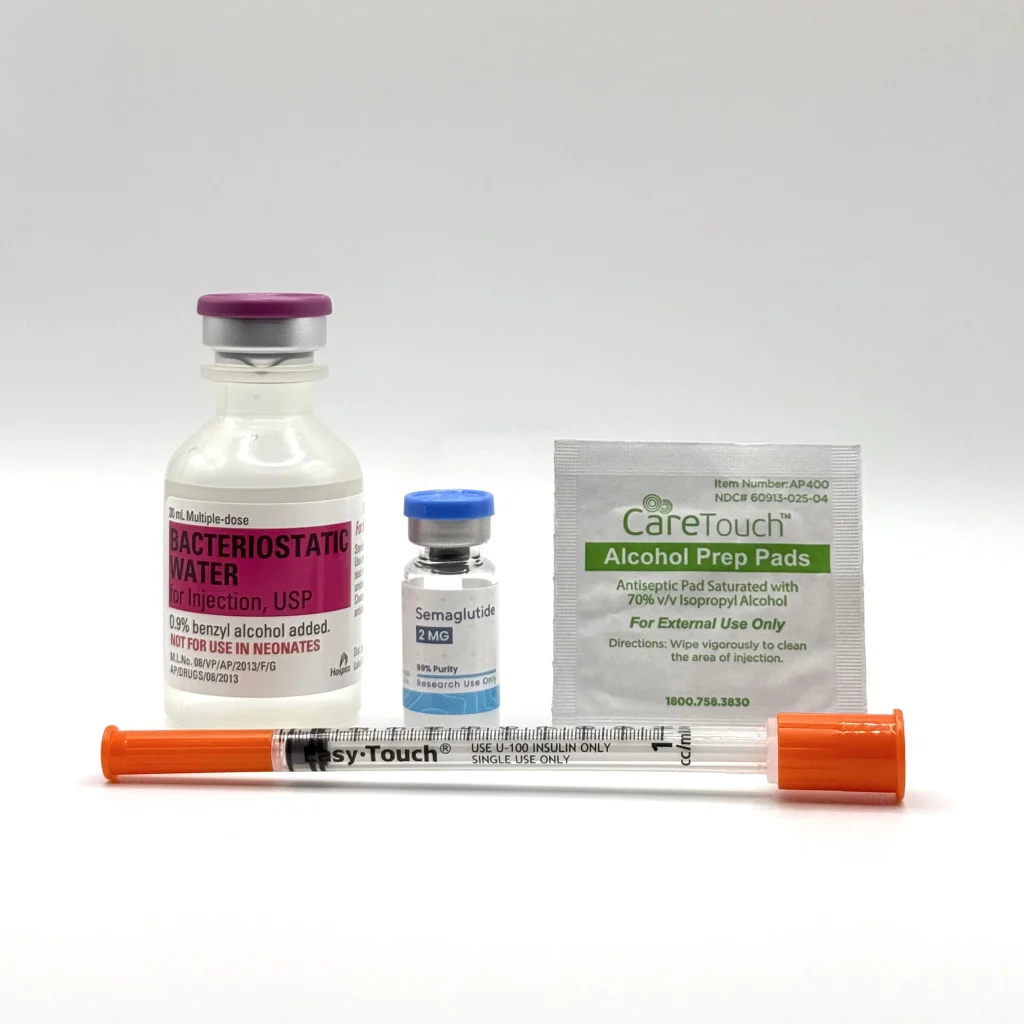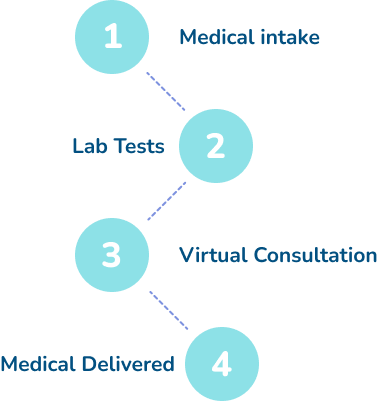Get Semaglutide Prescribed Online
- Includes access to a provider, medication, and free shipping
- No insurance needed
- Transparent pricing with no hidden fees
8000+ verified customer review






What is Semaglutide?
Semaglutide is a medication that mimics the action of a natural hormone called glucagon-like peptide-1 (GLP-1). It is widely used to treat type 2 diabetes and has gained attention for its effectiveness in supporting weight loss. You may recognize it by brand names like Ozempic (for diabetes) and Wegovy (for weight loss).
Semaglutide works by:
- Stimulating insulin release: It helps the pancreas release insulin after meals, lowering blood sugar.
- Reducing glucagon levels: It decreases glucagon, a hormone that raises blood sugar.
- Slowing stomach emptying: This helps you feel fuller for longer, curbing appetite.
- Enhancing insulin sensitivity: Over time, it makes the body respond better to insulin.
Pricing
Our doctor-led Semaglutide weight loss program offers a comprehensive approach to help you achieve a healthier future. It’s more than just medication—it’s a customized telehealth experience designed to meet your needs.
Here’s what’s included:
✔ 12 Weeks of Medication (All refills, all dosages, same price)
✔ Ongoing Provider Care & Support
✔ Metabolic Laboratory Testing every 6 months
✔ Syringes & Alcohol Pads Kit
✔ Nutrition & Wellness Coaching
✔ Platform Access & Educational Content

Lose Up to 15% body weight in a year
Semaglutide has proven highly effective in promoting significant weight loss. Clinical trials reveal that individuals using Semaglutide can lose up to 15% of their body weight within a year. These studies also highlight that Semaglutide delivers the best results when combined with a healthy diet and regular exercise.
Dosages
Units refer to the amount of medication drawn into the syringe, while milligrams represent your weekly dose. The number of units needed depends on the concentration of the vial you’re using.
| Volume (units) | Dose (mg) | Price per month |
|---|---|---|
| 10 Units | 0.25 mg | |
| 20 Units | 0.5 mg | |
| 30 Units | 0.75 mg | |
| 40 Units | 1.0 mg | |
| 50 Units | 1.25 mg |
| Volume (units) | Dose (mg) | Price per month |
|---|---|---|
| 5 Units | 0.25 mg | |
| 10 Units | 0.5 mg | |
| 15 Units | 0.75 mg | |
| 20 Units | 1.0 mg | |
| 25 Units | 1.25 mg |
How It Works
- Complete Medical Intake
- Undergo Lab Tests
- Attend a Virtual Consultation
- Receive Your Medication

FAQ
Are there any side effects associated with Semaglutide?
Yes, some common side effects of Semaglutide include nausea, vomiting, diarrhea, constipation, and stomach pain. These usually decrease over time as your body adjusts to the medication. Rare but serious side effects include pancreatitis or allergic reactions. Always discuss potential risks with your healthcare provider.
Who is eligible to use Semaglutide for weight loss?
Semaglutide is typically prescribed for adults with a BMI of 30 or higher, or a BMI of 27 or higher with weight-related health conditions like type 2 diabetes or hypertension. Eligibility is determined by a healthcare provider based on your medical history and health goals.
How do I administer Semaglutide injections at home?
Semaglutide is injected subcutaneously (under the skin), usually in the stomach, thigh, or upper arm. Use a clean syringe, follow the dosage prescribed, and rotate injection sites each week to avoid irritation. Detailed instructions and training are often provided during your consultation.
Does insurance cover compounded Semaglutide?
Compounded Semaglutide is often not covered by insurance since it differs from FDA-approved brand-name medications. However, it is typically more affordable than commercial options. Check with your provider for specific cost details.
How long does it take to see results with Semaglutide?
Many people begin to notice weight loss within the first few weeks, with significant results often appearing after 3–6 months. For maximum effectiveness, Semaglutide should be paired with a healthy diet and regular exercise.
Can I stop taking Semaglutide once I reach my goal weight?
Stopping Semaglutide without a plan may lead to weight regain. Maintaining results often requires continuing the medication or adopting long-term lifestyle changes. Always consult your healthcare provider before discontinuing Semaglutide.
Can I consult a healthcare provider online to get a prescription for semaglutide?
Yes, you can get a consultation from our team of licensed healthcare providers online. They can assess your health and, if appropriate, provide a prescription for semaglutide.

